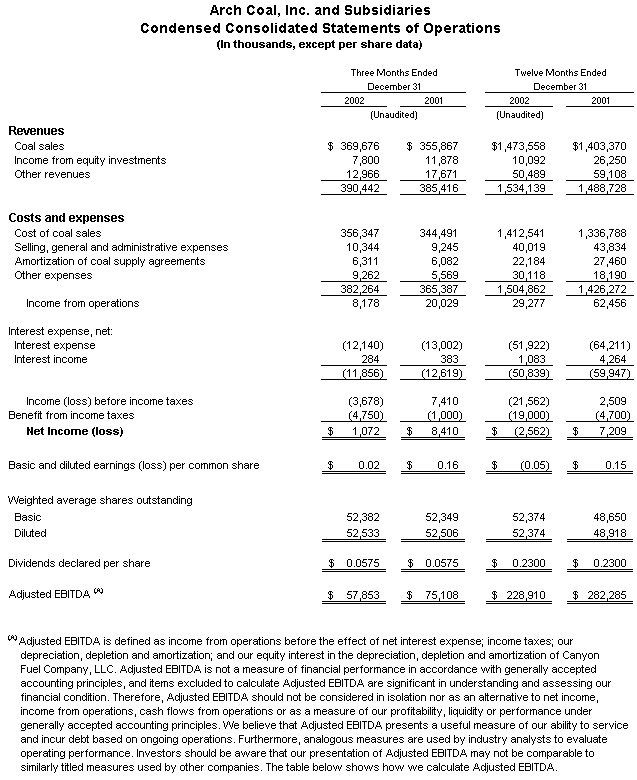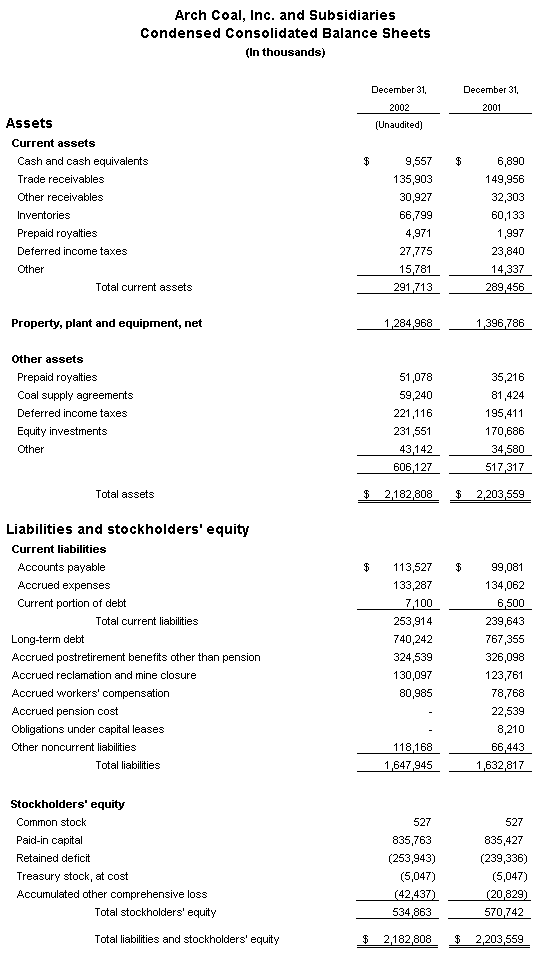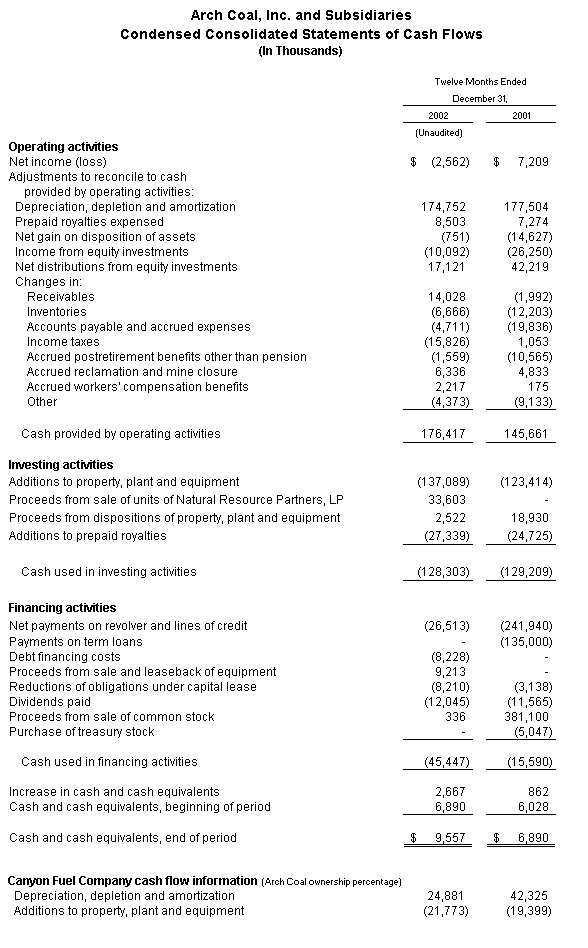Arch Coal, Inc. Reports Fourth Quarter Results
Arch Coal, Inc. Reports Fourth Quarter Results
January 23, 2003 at 2:27 PM EST
- Net income of $1.1 million, or $.02 per share, vs. net income of $8.4 million, or $.16 per share, in 4Q01
- Adjusted EBITDA of $57.9 million, vs. $75.1 million in 4Q01
- Total revenues of $390.4 million, vs. $385.4 million in 4Q01
- Coal sales of 28.4 million tons, vs. 28.5 million tons in 4Q01
- Debt reduction of $51.5 million during the quarter
"We achieved solid operating performances at nearly all of our mines during the fourth quarter, albeit at reduced operating rates," said Steven F. Leer, Arch Coal's president and chief executive officer. "We continue to see many positive signs that a rebound in U.S. coal demand and pricing may be forthcoming, and we are managing our operations in a manner that should enable us to capitalize when that rebound occurs."
During most of 2002, a weak economy and high coal stockpile levels at U.S. power plants exerted downward pressure on U.S. coal markets. In response, Arch made the strategic decision in early 2002 to reduce production until market fundamentals improved. During the fourth quarter, lower production levels, principally at Arch's eastern operations, again had an adverse impact on the company's results. Offsetting that impact somewhat was a nearly 400,000-ton increase in shipped volumes from the company's West Elk mine in Colorado compared to the same quarter of 2001. (Production at West Elk in the fourth quarter of 2001 was curtailed by high methane levels.) Brokered volumes also increased in the fourth quarter compared to the same period a year ago.
For the year ended December 31, 2002, Arch Coal had a net loss of $2.6 million, or $.05 per share, compared to net income of $7.2 million, or $.15 per share, in 2001. Total revenues for the year totaled $1,534.1 million and coal sales totaled 106.7 million tons, vs. $1,488.7 million and 109.5 million tons in 2001. Adjusted EBITDA totaled $228.9 million for the year, compared to $282.3 million in 2001.
Natural Resource Partners
In October, Arch completed the sale of 1.9 million units of Natural Resource Partners (NYSE:NRP), a newly formed joint venture created to manage coal royalty properties. Net proceeds to Arch, after the underwriting discount and expenses, totaled $33.6 million, which were applied to debt reduction efforts. The transaction is expected to be accretive to earnings. Arch continues to hold 34.1% of the NRP limited partnership units and 42.25% of the general partner interest.
Using the funds from the sale of NRP units and cash available from ongoing operations, the company reduced its debt by $51.5 million, or 6%, from levels at Sept. 30, 2002.
Arch's continuing interest in Natural Resource Partners contributed $2.3 million to equity income during the quarter. (Arch's equity income from its investment in NRP is reported on a one-month time lag and includes the effects of Arch's historical basis in the assets it contributed to NRP. As such, Arch's equity income from NRP may not be indicative of the results to be reported by NRP for the noted period.) Offsetting the increase in equity income related to NRP, equity income from Arch's 65%-owned Canyon Fuel Company declined from $11.9 million to $5.5 million, reflecting the expiration of a favorable sales contract at the end of 2001 and a weak market environment for Utah coal in the fourth quarter of 2002.
Operating statistics
Regional analysis: Of the 28.4 million tons of coal that Arch sold during the fourth quarter, approximately 7.7 million tons originated at its eastern operations and 20.7 million tons originated at its western operations. Arch Coal had an average realized sales price of $13.04 per ton and average operating costs of $12.57 per ton. The eastern operations had an average realized sales price of $29.93 per ton and an average cost of $29.34 per ton during the quarter. The western operations had an average realized sales price of $6.80 per ton and an average cost of $6.36 per ton during the quarter. (Western operations data does not include the results of 65%-owned Canyon Fuel Company, which is accounted for on the equity method.)
Expected sales volume for the first quarter of 2003: In the east, Arch expects to sell a total of approximately 6.0 million tons of coal in the first quarter of 2003 from its mines in Central Appalachia, excluding brokered tons. In the west, Arch expects to sell approximately 16.0 million tons of coal at its Black Thunder mine in the Powder River Basin of Wyoming, and roughly 1.5 million tons at the West Elk mine in Colorado, excluding brokered tons. Total sales (on a 100% basis) at Arch's 65%-owned Canyon Fuel operations in Utah are expected to be approximately 3.7 million tons for the quarter.
Financial: Arch expects depreciation, depletion and amortization to total approximately $200 million for 2003. Capital expenditures are expected to total around $160 million, as the company continues to limit capital spending due to the weak market environment. (Projections for depreciation, depletion and amortization and capital expenditures include Arch's ownership percentage in Canyon Fuel Company.)
Other developments: During the quarter, the company reduced its days sales outstanding in accounts receivable, from 38 days at year-end 2001 to 33 days at year-end 2002.
U.S. coal markets
Although coal markets remain under significant pressure, there are many positive indications that a recovery in demand and pricing is possible in the near term, Leer said. Among them:
- Electricity demand is growing.
- Many regions of the country, including the major coal-burning regions, have experienced substantially colder temperatures this winter compared to last winter.
- Natural gas prices are trading at levels more than double those of a year ago, which should result in power producers seeking to maximize output at coal-fired power plants.
- Coal production declined by an estimated 2.5% in 2002, and announcements of eastern mine closures and curtailments have continued in recent weeks.
- Extremely dry conditions in the western half of the country are threatening to reduce hydroelectric generation this spring and summer, which could boost demand for coal-fired generation.
Leer reiterated that Arch is focused on being a market-driven company and would not seek to increase output at its mines until the improving pricing environment attains levels that will allow satisfactory returns on the company's investment. "In the current environment, we believe it is in the best interests of our shareholders to leave uncommitted, low-cost reserves in the ground, rather than produce and sell them for little or no return," Leer added.
Looking ahead
Leer said that the company is not expecting an improvement in its financial results until coal markets complete their rebound. "In the first quarter, we expect continued stability and consistency at our mining operations," he said. "We expect sales volumes to be somewhat lower than in the fourth quarter as we continue to refrain from selling coal into the spot market, and ship only that tonnage which is already committed under contract."
While results from mining operations are expected to be comparable in the first quarter to those achieved in the fourth quarter, the company does expect an increase in costs in 2003, principally due to higher expenses related to its post-retirement health care obligations. These obligations, coupled with a much smaller increase in pension-related expenses, are expected to increase costs by approximately $8.0 million per quarter, reducing earnings by approximately $.12 per share. As a result, the company expects to lose between $.05 and $.20 cents per share during the first quarter of 2003, absent improvements in coal demand and pricing in the near term.
"Our projection for the first quarter assumes that shipping volumes will be substantially lower in the first quarter than in future quarters," Leer said. "If eastern coal markets continue the trend of recent weeks by strengthening further, and if western markets follow suit, we could see increased shipping rates and a stronger performance in the first quarter."
"We are confident that power generators will require more coal in 2003 than they currently have under contract," he said. "While we can't predict exactly when demand will accelerate, market fundamentals continue to strengthen, and we expect an improving market to have a favorable impact on sales volumes and pricing as the year progresses."
Forward-Looking Statements: Statements in this press release which are not statements of historical fact are forward-looking statements within the "safe harbor" provision of the Private Securities Litigation Reform Act of 1995. These forward-looking statements are based on information currently available to, and expectations and assumptions deemed reasonable by, the company. Because these forward-looking statements are subject to various risks and uncertainties, actual results may differ materially from those projected in the statements. These expectations, assumptions and uncertainties include: the company's expectation of continued growth in the demand for electricity; belief that legislation and regulations relating to the Clean Air Act and the relatively higher costs of competing fuels will increase demand for its compliance and low-sulfur coal; expectation of continued improved market conditions for the price of coal; expectation that the company will continue to have adequate liquidity from its cash flow from operations, together with available borrowings under its credit facilities, to finance the company's working capital needs; a variety of operational, geologic, permitting, labor and weather related factors; and the other risks and uncertainties which are described from time to time in the company's reports filed with the Securities and Exchange Commission.



